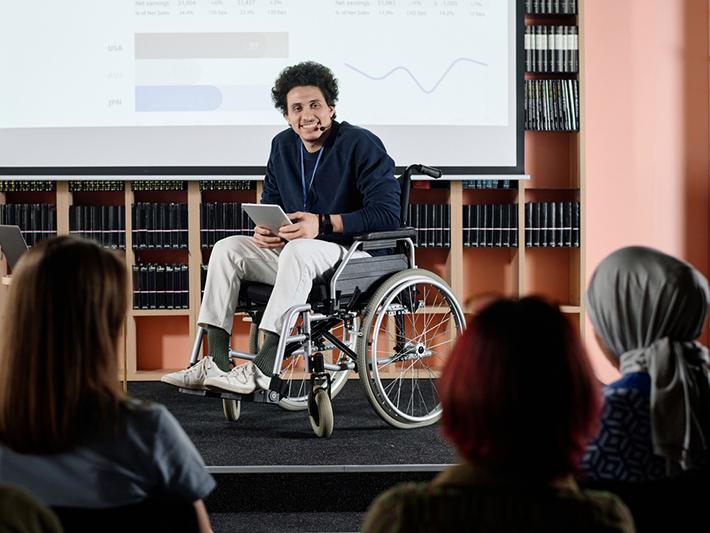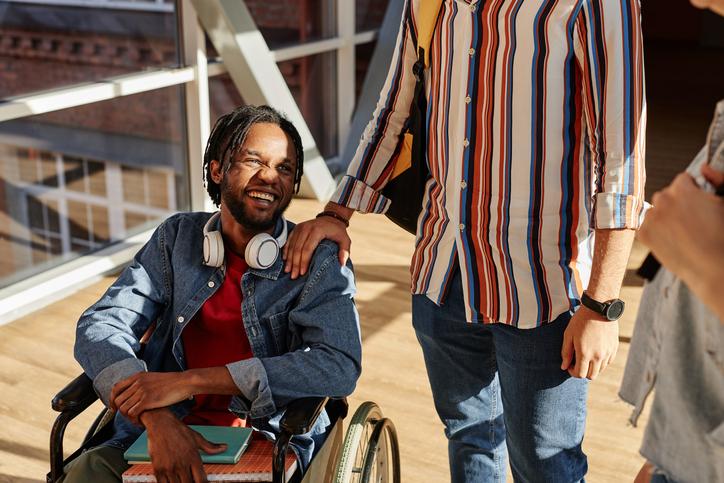
Creating inclusive spaces for inclusive events

You may also like
The number of disabled students and staff at UK universities has increased over the past few years. Almost 7 per cent of staff in universities declared a disability in 2021/22, a doubling over the previous 10 years, according to data from Advance HE. The rate has tripled for students, with 15.9 per cent declaring a disability in the same period. So, universities need to consider how to make their spaces and events such as graduations more accessible.
At De Montfort University (DMU), this work is part of our equality for all cross-cutting theme, which is in turn part of our Empowering University strategy to support our staff, students and partners in building a fairer society. Creating inclusive events enables people to feel safe in that space. It is important to note that most disabilities are not visible (for example, neurodivergence) and people may not wish to disclose they have a disability, so opportunities to request support in advance should always be available. Inclusive environments cater to the needs of all individuals regardless of their disability or disclosure.
- Making your campus neurodivergent friendly
- Get real about hiring people with disabilities
- Make universities disability-inclusive, part one: feedback, access and language
Based on what we have learned at DMU, this article will present eight ways in which universities can make their events more inclusive.
- Invite disabled and neurodiverse speakers. Providing an inclusive platform that represents diverse groups helps to encourage and engage participants. It also demonstrates that the event is truly inclusive for all.
- Put materials online before the event. Making materials accessible online prior to the event enables participants to adapt the material into a format suitable for them. It also means participants don’t have to declare that they need a different format; not all people feel comfortable doing so. An online map of the venue, preferably with a virtual tour, enables participants to familiarise themselves with the facilities in advance, reducing anxiety.
- Have quiet spaces at the event. Often events are noisy and busy. Those who experience sound sensitivity or struggle with crowded spaces may be overwhelmed. Quiet spaces give people a place to go and take time out if they need to. Outdoor spaces are also recommended because neurodiverse attendees may seek out fresh air. Be sure to advertise in advance that quiet spaces will be provided. This will make individuals feel more comfortable that if they need to take a break or time out, they can do so without having to say anything specific to organisers. People often prefer to seek out quiet space for themselves.
- Provide early access to sessions. Some event attendees may benefit from earlier entry to activities; this will permit them to identify the best place to sit or stand (such as near an exit or next to a wall). This could also apply for lunch and refreshments to avoid queuing and reduce anxiety around delays in choosing food or drink.
- Consider all aspects of accessibility. Think about the area where the event will be held. Accessibility goes beyond whether the space is wheelchair accessible. Other factors to consider include lighting, echo, contrast and signage. Lighting level can impact individuals with visual impairment or light sensitivity; echoing within the space may affect individuals with hearing impairment or those who struggle in echoey spaces or have vision problems (which make auditory information critical). You may wish to consider contrasts when it comes to spaces in terms of colour on walls and doors and texture of the floor. Such contrasts help those with sight loss to navigate, especially long cane users. Additionally, ensure that signage is clear and the event space offers adequate accessible private bathroom facilities. Some attendees may have hidden disabilities or require clean and safe spaces to administer medication.
- Create multiple ways to attend. Given potential funding cuts to conference budgets, the cost of travel and how we have developed more capacity to do things in a hybrid format, offer the option for participants to attend online, whenever possible and appropriate. We understand this will not always be possible because of the nature of the event. Enabling online attendance may give more people to opportunity to attend, whether their travel limitations are because of, for example, disability, childcare or cost.
- Diversify options for event engagement. Some participants may not wish to engage in group discussions or feel comfortable being called on to share their insights (as a result of social anxiety or speech difficulties, for example). Provide online opportunities to raise questions or viewpoints using tools such as Padlet. Participants may benefit from the provision of a notebook and pen to support capturing their thoughts or for doodling, a common activity for people with ADHD.
- Consult disabled staff and students. You will probably have many disabled staff and students at your institution. When planning events, consult these groups because they will be able to give you valuable insight into how to make events more accessible.
This list is not exhaustive, but we hope it gives insight into how you can make your events more accessible. Students and staff have different needs, and recent attempts, such as by Nottingham Trent University, have aimed to develop relaxed graduation ceremonies for those who need it.
In the past year our work at DMU has focused on building more inclusive spaces where people do not have to declare their disability needs but are accommodated. We propose this makes people feel safe in these spaces.
Meredith Wilkinson is senior lecturer in psychology and Leanne de Main is deputy dean in the Faculty of Business and Law and associate pro vice-chancellor in education; both are at De Montfort University.
If you would like advice and insight from academics and university staff delivered direct to your inbox each week, sign up for the Campus newsletter.


